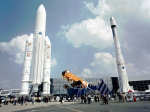 For those of you who didn’t get to go to the Paris Air Show at Le Bourget and have been left behind, like me, to swelter in the heat and humidity of late June in the District of Columbia (or elsewhere), ExportLawBlog brings you the next best thing — a blog post on Le Bourget! (Well, maybe not the next best thing.)
For those of you who didn’t get to go to the Paris Air Show at Le Bourget and have been left behind, like me, to swelter in the heat and humidity of late June in the District of Columbia (or elsewhere), ExportLawBlog brings you the next best thing — a blog post on Le Bourget! (Well, maybe not the next best thing.)
It seems that John Douglass, president of the Aerospace Industries Association, did get to go to Le Bourget where he got to wash down a few amuse-gueules with a few coupes de champagne and to complain about U.S. export controls. Now that’s the life!
As reported in today’s EE Times:
John Douglass . . said that while export controls are necessary to protect national security, both sides agreed that more liberal export policies could help spur effective aerospace trade and technology cooperation among allies. . . . Global civil aviation sales are particularly strong, and Douglass said “We could even do better if we had a better rule set” for exports, said Douglass.
So far, so good.
The current U.S. export control is “based on two systems,” said the AIA president. One is for military exports that are tightly controlled by State Department, which “essentially says ‘no’ to exports,” Douglass argued.
That’s either the champagne talking or the reporter misunderstood Douglass. For as much as we criticize DDTC here at ExportLawBlog, we have never accused them of just saying “no” to exports.
Douglass then suggested, somewhat more sensibly, that international technology cooperation programs should be licensed based on the countries involved:
If you are a NATO country, you will be given ‘level- one’ cooperation, for example. But if you are a level-two nation, more controls are imposed.
It might make sense to codify a tiered approach, but it is quite clear that such an approach does currently inform licensing decisions at DDTC. It’s easier to get a TAA with a company based in a NATO country, for example, then it is to get one with a company in the UAE.
But the most interesting thing Douglass had to say he saved for last:
AIA hopes to ensure that the current U.S. export control system can be made more efficient and transparent. “But the best time to get this done is when the administration changes after the election next year,” said Douglass.
Notice how Douglass just slipped that in. The best time is after “the administration changes.” This is a tacit admission that the export reform proposals that the AIA made to President Bush through an industry group, and that we previously reported here, aren’t going anywhere.
Anyway, that’s the end of our trip to Le Bourget which, like all trips to France, are always too brief. Alors, très chers lecteurs de mon blog, à la prochaine!
 Permalink
Permalink
Copyright © 2007 Clif Burns. All Rights Reserved.
(No republication, syndication or use permitted without my consent.)

 Posted by
Posted by  Category:
Category: 

